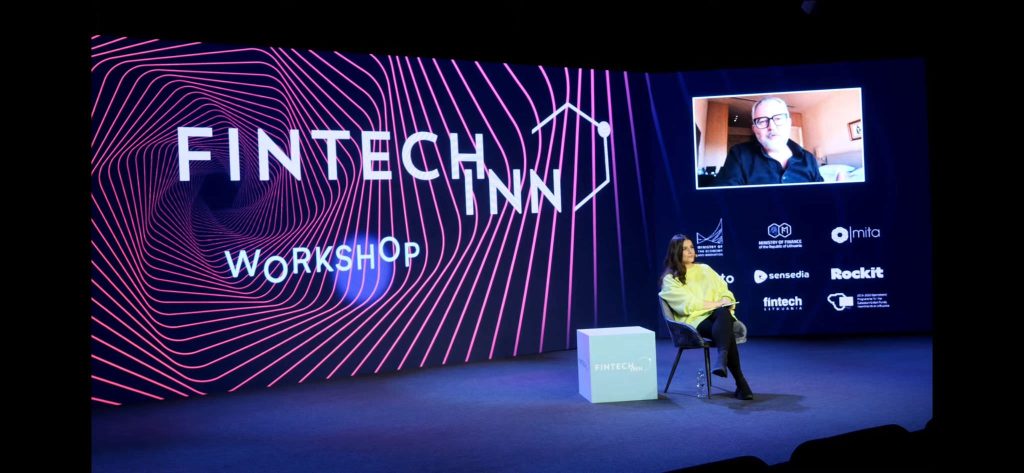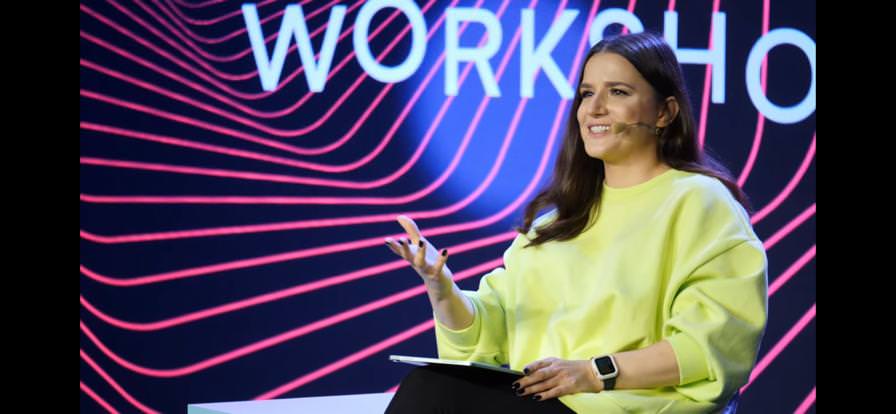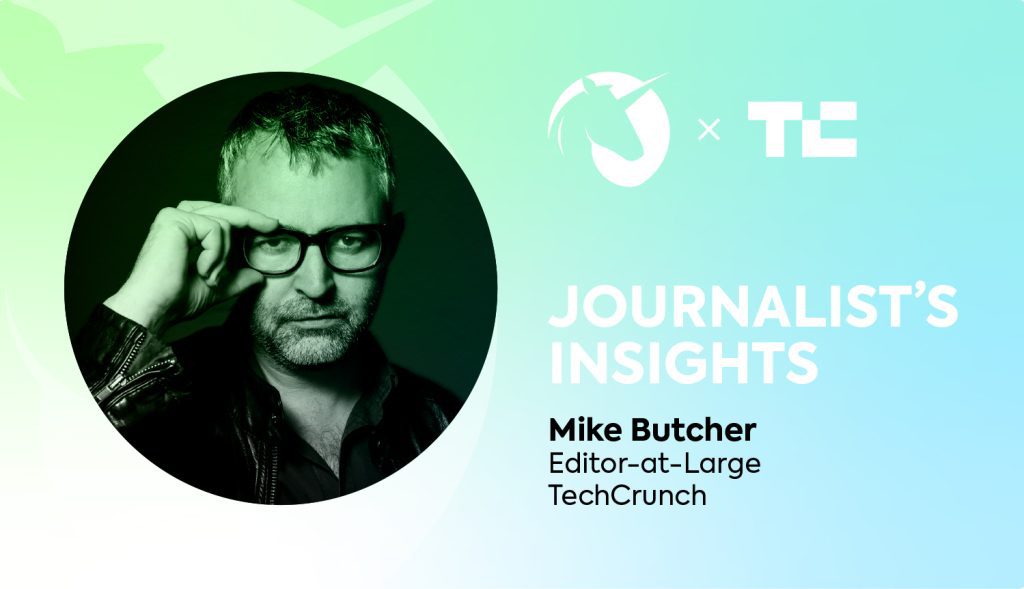Hungry for new ideas? Curious about channelling the energy of Fintech into creating a sustainable future? We are! And we were so stoked to be part of Fintech Inn last year. Our very own founder and CEO of Black Unicorn PR, JJ was the moderator in this super interesting interview with none other than Mike Butcher (@mikebutcher) – check it out below!
What are we gonna chat about?
How do startups relate to the media? You’re a founder thinking about your business strategy – how should you relate to the media? What is the message you should be getting across? What would the media actually be interested in? You’ve got a little money; you’ve got half a million in startup funding. Is that even relevant? Does TechCrunch even care about half a million these days?
What are journalists and tech media interested in these days? That’s what we will be talking about in this very practical, hands-on session.
Let’s get cracking!

Startups, PR and the Media in 2021
Moderator: JJ Jegorova – Founder and CEO of Black Unicorn PR
Mike Butcher: TechCrunch’s Editor-at-Large
JJ: Hello Mike. Thank you so much for finding the time in your busy schedule to join us today. How are you doing?
Mike Butcher: I’m great, thanks. How are you?
JJ: Very well, thank you. It’s the last session today, so we are expecting a lot of people to tune in. We will be talking about startups, public relations, PR professionals, and obviously TechCrunch, so we are very excited to get some of your insights. Let’s get cracking with quite a broad question. What role does the media play in the world of startups?
Mike: I think it’s pretty crucial. There’s a lot of noise out there, and startups are always clamoring for attention. Firstly, it’s about getting your product known. There’s also the issue of fundraising and showing that you’ve got investors’ confidence, and it’s very useful for hiring. The more ‘in the media’ you are, the more likely you’ll attract the attention of potential hires. The other thing that is important to remember is that you’re trying to improve whatever industry you’re in, which means that you’re trying to educate the market. So it’s very important and can’t be underestimated.
JJ: I totally agree with you. How would you think Covid-19 has affected how European startups are being perceived right now? Have you noticed much change, especially in your line of work?
Mike Butcher: Because of the shift to remote working due to Covid-19, journalists went back to an older style of journalism where they didn’t meet people very much. They spoke to them on the phone. But of course, in the 21st century, we’re on Zoom or Google Meets. So, that was obviously a big change. Interestingly, I think it meant quite a lot of coverage in many ways. Journalists experienced the same thing as anybody during the pandemic. There were people burning out and overworking. The things that happened to all of us also happened to journalists. However, there were some advantages in the sense that some meetings that you used to do in person that weren’t super important and would take you out of the office for a couple of hours or maybe a day could now be a quick meeting over Zoom. It’s made things more varied.
JJ: Being a PR, I understand that journalists are flooded with pitch emails and have a lot of work. Could you explain what your day-to-day is like? I’m sure you don’t have enough time to go through all the hundreds of emails and reply to every single pitch you receive, whether it’s good or bad?
Mike Butcher: All types of journalists get lots incoming, but it comes from all angles. I don’t just get pitches on email. I get them on DM, on Twitter, on Instagram, SMS, WhatsApp. You name it; it comes in on all channels. Something to note is that if someone is trying to contact a journalist via text message, it will have to be pretty succinct, whereas if you’re going to be doing it on email, you have a little bit of a broader canvas. It depends on the relationship you’ve got with the journalist. If you know them well and you’ve talked to them in the past, you perhaps have a relationship where you won’t offend them by sending them a quick text. Suppose you don’t know them well and you’re contacting them completely out of the blue. In that case, that’s a little bit more of a high-risk strategy because a journalist might not feel great about you directly contacting them like that when they are busy, and they have other more important projects on the go. One of the best ways of thinking about it is to think about a subject line of an email that’s very concise. The email then needs to be maximum of 3 bullet points: ‘This is what we’re doing; this is the news; this is what we’re announcing – Is this of interest to you? Just a quick yes or no and I’ll send you some more information.’ That’s actually quite a good pitch because it means that I can make a quick decision about that pitch. If you send War and Peace or the complete works of Shakespear and an enormous pitch, then it’s going to be harder to read. Let’s face it. So, being short and concise is key, and the method of communication depends on your relationship with that journalist.
JJ: How many pitches do you reckon you get per day regardless of whether it’s via email, ,SMS or DMs on Instagram?
Mike Butcher: I think it probably runs into hundreds – certainly over a hundred.
JJ: Daily?
Mike Butcher: Yes
JJ: Wow! So I assume you really don’t have enough time to go through absolutely everything because you have to write articles and other projects you’re working on.
Mike Butcher: Yup! And then, of course, you go away to do some writing, you come back, and you find there are more pitches. So, it never ends, really. It just comes with the territory. One does need to be aware of that when pitching journalists, though.

JJ: At what stage does a startup pitch to TechCrunch? Is the investment of half a million or a million enough nowadays? And also, what is the best way to pitch you, because you did just say emails perhaps, but what about Twitter DMs?
Mike Butcher: Like I said, it does come back to your relationship with the journalist. If you have one already then the journalist probably won’t mind a Twitter DM. You can do it a couple of times. If they don’t reply, then they probably have seen it and are too busy to respond. In terms of fundraising levels, firstly, if you’re doing a generally interesting technology product, then perhaps the funding amount matters less. Obviously, things get more interesting the more money you’ve raised. I don’t think it’s a bad thing to reach out and say you’ve raised three hundred grand or five hundred grand, but I probably would not really expect you to get covered, particularly at that level. It’s when you get to late seed stages, into the early millions or Series A, that you’re more likely to pick up coverage because you’re talking about more substantial amounts of money. And then, of course, it’s not just the amount of money, it’s also who’s involved, it’s the investors. Are they top-tier investors? Are they well known? That becomes an issue as well. There are lots of other things as well. For instance, perhaps you might get a celebrity investing in you. Perhaps that’s an interesting angle. The money becomes more important the more money it is for obvious reasons, but I think it’s important to start establishing relationships with the media early on. You might not get coverage early on with those small amounts, but at least they might be aware that you exist.
JJ: Yes, and I’m sure is it important to establish this relationship with journalists and not treat them as just tools that will get them coverage. So, would you urge founders to chat with you even if they are raising around one million or less, and it may not result in any sort of coverage? You might at least have a conversation with that founder for your future pieces, or you might at some point remember them when you are doing some other works?
Mike Butcher: Yes, but you also might get lucky. Perhaps that week we’re covering a big story in your sector, and there might be something that you’ve done that’s relevant to that story. I always say that when large players make big announcements, like when Apple comes out with a new product, and you’re operating in a similar sector, perhaps that might be a good time to talk about what you’re doing. It’s always good to get on the back of big announcements because journalists are looking around for stories in a similar space.
JJ: If CTOs and CEOs lack marketing/ PR experience and are not into the world of news and reading everything, would your advice be to keep up with what’s happening and try to tap into the news agenda where possible?
Mike Butcher: Look, I think it would be strange if a founder wasn’t keeping tabs on the news in their industry. I think it would be kind of silly and not a good idea. I expect founders to be experts in their industries. I expect them to know what’s going on in their sector. If they don’t, then that’s maybe a red flag for me. Perhaps they don’t quite understand the market that they’re playing in. I like to see expertise amongst founders, and I like to see them showing that they know what’s going on in the news regarding their sector. That inspires confidence in the journalist and makes it more likely that the journalist will cover your story. It’s good practice to keep reading the news, just tap in every day or every other day. Perhaps in your meetings with your team, you should discuss what’s going on in the news in your sector. It’s just a good muscle to work so that at the point when you want to talk more publicly about what you’re doing, you can show that you’re an expert in your field and can show you know what you’re talking about.
JJ: Absolutely. Can founders pitch you for non-funded stories, and if they can, what kind of stories do you think would catch your attention?
Mike Butcher: Well, that comes back to the question of what’s going on at the time. Perhaps there’s a big player in the market who’s made a big announcement, or there’s big news happening about an issue. Obviously, we’ve heard a lot about how Facebook carries a lot of misinformation in the last few months and years. If you’ve got a product in that area about mitigating that misinformation or stopping trolls, that’s a relevant story and doesn’t require a funding event to get covered. What else is hot right now? Climate change, for obvious reasons. Climate is hot, and startups are trying to address this directly. That is an ongoing story. The usual new industries are Direct Air Capture, Carbon Sequestration or Offsetting. In fact, this morning, I did a story about a startup that has an API for tracking carbon emissions and offsetting. This is an ongoing story. It doesn’t necessarily require a funding round, but that’s nice to have. Perhaps you might want to time that story with that funding round. If not, and if you’re coming out with a brand-new product, why not? There are always ongoing stories around this issue. Of course, the shift to remote working with the pandemic has meant there are a whole bunch of startups geared toward remote working that have new products and are not necessarily about funding rounds.
JJ: When startups have funding announcements, founders often receive pressure from investors to release the news ASAP, leading to contacting journalists at the last minute. What should the timelines be when trying to pitch you for either a funding announcement or an ongoing story that might be relevant?
Mike Butcher: Well, I think that usually the more time a journalist has to understand what the story is, the better. You can also pitch too early. Pitching a month in advance is too early. Anytime between a week and a few days (preferably about a week) is useful. Then the journalist can schedule interviews and do some more research and there will be a better story as a result. What’s really annoying is when a startup that’s not very big says, ‘we’re launching this afternoon’ or ‘tomorrow’— the likelihood of you getting covered decreases quite drastically. Big companies can do that. Large startups, that have many moving parts might say, ‘we’re announcing it this afternoon’ or ‘we’re announcing it tomorrow morning’ or ‘we’re announcing it right now!’ That’s their privilege because they’re very large players in the market. But if you’re still a small player, it’s better for you if you give the journalist a lot more notice and a lot more time.
JJ: Okay, that’s noted. And when it comes to pitching, you said you could follow up with a couple of emails. How many follow-up emails is one too many? How do you make sure your pitch actually gets noticed besides having a great subject line?
Mike Butcher: If you send me the same email four times, then you quite clearly want to get my attention, but if I still haven’t replied after the fourth email, then let’s face it, you’re not making the cut at the moment. I often find that’s the simplest way because it’s not a text message and doesn’t require immediate attention. Yesterday somebody was messaging me, and I didn’t reply because I was obviously busy. I mean, did you email about it? I think an email nudge – just popping it back up to the top of an inbox – is usually the most polite, and quite efficient. You won’t annoy anyone with that. In the last email, you might say, ‘it sounds like you’re busy’ or ‘it’s not the story for you. I’ll go and pitch it to somebody else or move on,’ and then the journalist might go, ‘oh okay, this sounds interesting after all. I’ll jump in before the story goes somewhere else.’
JJ: If you do not get back to a company after four emails and you see that someone else has covered it. Would that in any way affect your relationship with that company? After the fourth email, would you expect them to let you know that they are going with a different journalist from TechCrunch or an other title?
Mike Butcher: I think it depends on the timeline. If you’re a week ahead and you’re trying to reach out to a specific journalist, and after the second or third email they haven’t responded, then fine, maybe they’re busy. Usually, they will reply to be honest with you, even if it is to reject the pitch. It’s kind of unusual to not. Sometimes, things do happen, and you just miss an email. I mean, I get a lot of emails, so unfortunately sometimes I will miss one somewhere along the line. That’s just the way things go. If it turns out that that story comes out in another publication or with a college – I mean, I would rather it was under my title, so we got the story anyway – that’s fine. If I missed it and it comes out somewhere else, I don’t mind. That’s just the way the cookie crumbles. I don’t resent that. I won’t take offense. It’s the nature of the business. What you have to avoid is pitching to two journalists from the same title at the same time. That’s called double-pitching, and you’ll end up with a situation where both journalists think that they are the one talking to you and you’re talking to both. That’s deeply annoying and can land you in trouble, and confusion will ensue as a result.
JJ: And if someone is offering you an exclusive, you expect it to be exclusive. By that I mean that you’re the only journalist talking to them…
Mike Butcher: If someone is offering an exclusive, then I expect them to be talking only to me. But if they’re taking it to two journalists at the same time, then that’s not correct, and I’ll take a dim view of that behaviour.
JJ: What other tips would you give to founders to get through the number of emails you have? Perhaps following you on Twitter, or having a chat with you and inviting you for a cup of coffee?
Mike Butcher: Well, it does come back to the strength of the story. It might be how much money you’ve raised. It might be which investors you’ve got involved. It might be the new products you’re launching or the new company. You’ve got to get good at storytelling around those issues. You can try different weird tactics, but ultimately it comes back to the story. Ultimately, the questions will all be the same whether you’re sending the pitch on email, Twitter DM, SMS, WhatsApp, or a telegram. The questions are still going to be the same. What’s happened? Who’s involved? What’s the product? What’s the news? Simple as that. The other thing that you’ve got to remember is that you existing as a startup company is not news. Just existing, is not news. It’s got to be something that is new to do with what you’re doing.
JJ: Do you prefer receiving a press kit or images in the first pitch email, or do you prefer to receive that once you have taken the conversation further?
Mike Butcher: I think if you’ve got all of those assets ready to go and lined up on a cloud provider, then that’s a good thing. The assets are different from the pitch. The pitch has to be short and concise. Sure, maybe if you want to send the whole pitch and press release, go ahead. Perhaps we’ll discuss how we’ll be covering it or what kind of interviews we need to do. Having those things already is probably the best idea. Personally, I hate people emailing me large photographs. That just clogs up my inbox. There’s no excuse these days – It’s 2021 – upload your assets to a cloud provider like Dropbox or Google Drive. Also, by the way, we’re not in print. TechCrunch is not a print title. We don’t need a 10gb photograph of the founders. Let’s have a 300kb photo rather than a 300mb photo. Any photo that I get that’s already 300mb, I automatically resize. That’s just extra work for me. So why make it hard for the journalist? Just make it easier and make the photo 300kb, and we’re all happy. This is not vogue magazine, okay? It’s not a double-page spread. You’re going to have a photo on a website. That’s what’s happening.

JJ: Talking about photos. Photos have a very important role. They show the culture of a startup and the founders. A lot of the time, they are very static, boring images. Do you have any thoughts on how to make the photos stand out?
Mike Butcher: Three white males sitting at a desk is pretty boring, let’s be honest. If you are three white males as founders, consider throwing away the startup, starting again and having a female co-founder. I’m half-joking. But if you are pretty standard-looking, then try do something a little more unusual. The key to having a good photograph is hiring a decent, professional photographer. Most startup founders have their photographer be their friend from next door, and the photograph looks terrible. Have a decent photographer with great lighting and maybe pose in a way that is a little more interesting.
JJ: Do you have examples of some of the worst and the best pitches you have received?
Mike Butcher: Usually, there are three main common mistakes. The first is that they’re very personal saying, ‘Hi Mike, how’s the weather in London? I saw you at a conference the other day’. Can we get to the point here? The second thing is that they’re really vague. They don’t get to the point. They dance around the issue. The third is that they send War and Peace or Shakespear’s complete works, and it’s a whole A4 page of a ten-point pitch that I have to sit down and actually read. It’s just too much. You want to get to the point – we’re this; this is what happened; this is our fundraising; we’re launching ‘x’; it will compete against ‘y’; here’s why it’s better than the competition. Bullet points are simple to digest. The worst ones are the classic, ‘we’re changing the world’ etc. It’s hyperbole.
JJ: ‘Disrupting’? ‘Revolutionising’?
Mike Butcher: My pet-hate word right now is ‘we’re democratising’. We’re ‘democratising access to…’ It’s totally overused. Usually, they’ve got nothing to do with democratising. It’s just a product.
JJ: It does seem like every year there is one particular word that everyone’s using. It was ‘we’re innovating’. A couple of years ago, it was ‘we’re revolutionising’ and it seems like this year the word of the year goes to ‘democratising’.
Mike Butcher: They never go away. Everyone keeps using them, and they’re all rubbish.
JJ: Got you! And what about Twitter? We have a lot of viewers from the Baltics, where Twitter is not as popular. You don’t get a lot of founders or investors on Twitter. Everyone’s pretty much on Facebook or LinkedIn. But of course, when we look at other regions’ media, all the journalists live on Twitter. So how important do you reckon Twitter is for startup founders, especially from the Baltics, and do you urge both a startups and founders to have handles on Twitter?
Mike Butcher: It depends on culture. In the western media Twitter is a big deal. It doesn’t mean that you as a founder have to be on Twitter all the time. Maybe having a profile simply so that you can follow journalists and see what they’re talking about might be useful for you. I think that the important part about it is not to just randomly tweet but to engage in a subject. If you see something that a journalist is talking about on Twitter and you can say something intelligent about that subject, you’ll probably catch their eye, and they’ll maybe follow you back and start a conversation. In other cultures, perhaps there is a larger use of LinkedIn. I don’t really use LinkedIn because LinkedIn seems to be full of recruiters. I think all of these things are just messaging platforms, which is why I come back to using email intelligently. I personally do not use my LinkedIn regularly. If you have something that a startup is trying to get out desperately and quickly, then I would not rely on a quick reply on LinkedIn, because unfortunately there are just too many recruiters and random pitches from crazy people who are using and abusing it.
JJ: So, Twitter would be one of the best platforms for social media, but keep pitches to email?
Mike Butcher: Yes, but I don’t think you can say very much on Twitter. Twitter is a way to say ‘hi, I emailed you’, and then you can check to see if you got that email. I wouldn’t try to do enormous pitches on Twitter. That can also get lost. I can’t mark as unread. I can’t forward it to anyone. It doesn’t really work.
JJ: What is your process of looking into a company when you receive a pitch? What platforms do you look them up on, so that founders know what they have to have in place before they pitch to you?
Mike Butcher: I don’t care if they are on Twitter or not. What is interesting is the story of what they are doing. Presumably, they’ve got a website, I mean, duh! And an app or some press materials and pictures of the product or founders or both. I don’t spend a lot of time seeing if this person has a LinkedIn profile or not. What is useful is if they have company information on an official database. It’s also very useful for companies to have a Crunch base page. That’s probably the most useful thing they can do aside from the obvious things because that lists important information such as the investors.
JJ: Now that everything is online, how often do you interview founders? Is there usually enough information in the press release that they provide?
Mike Butcher: I interview as many founders as I possibly can, even if that’s just a Q&A over email because there are always more questions to ask. Depending on time, I’ll almost always follow up with an interview, preferably over Zoom. However, it is time dependent. Many large companies making large announcements don’t have time for interviews, in which case I rely on the press announcement.
JJ: Some founders get very nervous for interviews with journalists. What tips would you have for founders being interviewed?

Mike Butcher: Well, hopefully I don’t come across as too scary, but we will ask you direct questions so you’ve got to know what you are talking about. There are a lot of sectors that I’m not an expert in, so if I’m not an expert in your sector then I expect you to be able to explain it to me. I may ask you simple questions like ‘how does it work?’. The biggest mistake that founders make in interviews is that they use ‘marketing-speak’, whereas it’s better for them to be more direct. The main thing is to be honest and prepare in advance. You’re going to have to cover all of the basic questions such as what does it do; how does it work; who’s involved; who are the investors; why are you doing this; what was wrong before; who are your competitors; why are you better? If you are good at answering those questions then the interviewer will want to ask deeper questions.
JJ: Do journalists usually send questions before the interview or do you want the founders to know what they are talking about and ask them some on-the-spot questions?
Mike Butcher: We’re not here to catch you out. Journalists will not send questions ahead of time. It’s unwise for founders to get into the habit of saying what’s on the record and what’s off. Journalists are only trying to get some basic information, so just be straight in an interview.
JJ: For startups from the smaller markets such as the Baltics and Eastern Europe where there aren’t as many investments as there are in the UK, Germany or France, what tips would you give to get coverage besides having a very solid story or having a story directly related to a particular market that you’re currently covering?
Mike Butcher: I’ve covered the European tech scene for over 15 years, and I’ve been a journalist for 25 years. If your company is good and you’re going places, I don’t care where you are from. The mistake that companies make is that they emphasise where they are from too much. What you are doing and your story is far more important. Where you are from is more important to the investor because some jurisdictions are difficult to invest in, but it is not important to the journalist. The journalist is interested in the product, the story, how much money you have raised if you have investors’ confidence, and if you’ve got traction and doing well in your market. Where you are from is, in fact, far less important in 2021 than it was five years ago. If you look at the crypto industry, nobody knows where anybody is. It’s a global market and not regional at all. The fact that you are offering a service in a particular market such as Spain or Germany may be important to your story, but I wouldn’t let it phase you.
JJ: How do you feel about news wires? Have you ever received any decent news wires, or do you reckon they are a waste of money? Do you think startups should build a relationship with journalists rather than waste money on wires?
Mike Butcher: I never look at news wires because once it’s on the news wire, it’s already published, so why would I look at it? A company may put a release on news wires because it’s a regulatory requirement. Perhaps they just want to see if somebody picks it up on some other service, but it’s pretty irrelevant to what I do.
JJ: There are some myths that I would like you to confirm or bust, the first one being, do journalists hate PRs?
Mike Butcher: No. We work with PRs all the time. They are very useful because they usually understand what the medium needs. They have lots of clients, and they bring stories. Some are more interesting than others, but we are all professionals, and we will give each other quick answers. It’s not a requirement for founders to hire a PR, especially at the early stage. They can be very expensive and so it can be just fine reaching out to journalists personally. It’s important for founders to learn the skill of dealing with media on their own. If they find it difficult to talk to the media, then that’s fair enough, and then a PR will be helpful for them, but no, journalists don’t hate PRs.
JJ: Good to know! How about ‘earned media has the same value as a paid article’?
Mike Butcher: No. If you are covered by a genuine journalist under a title, that’s worth more in media terms than buying a sponsored article or branded content.
JJ: PR pros can control what journalists write?
Mike Butcher: No, PR professionals can’t control what journalists write.
JJ: And if someone does not like the tone, you will not be changing the article itself, but can change any factual errors?
Mike Butcher: An article may be changed if it’s factually incorrect, and you’ll have to prove that. A tone of an article is a very variable thing. It’s not a press release. On the other hand, do you want to be respected in your industry, or do you want to look like you are just pushing out a lot of PR all the time?
JJ: ‘An article is not just a reprinted press release’ meaning that you use a press release as supporting information to write an article. Instead of copying and pasting the press release, you do the work and the digging.
Mike Butcher: Press releases are background information, and if there are factual pieces of information in there, you might use them. A journalist might use a quotation from a press release, but they do not reprint the press release, no.
JJ: ‘Published articles should translate into sales’?
Mike Butcher: That’s not my job. I don’t really care if the article translates into sales or not; that’s the startup’s job.
JJ: When it comes to being in the media, it’s all about reputation and creating brand awareness instead of driving sales?
Mike Butcher: You might be lucky enough to get a link to your company in the article, and customers may click that link and go to your website. If your company is good, you’ll get some sales out of it, but it’s nothing to do with me or the media.
JJ: I believe that some of the media outlets have a policy of not adding a link to any article full stop because, as you said, it’s not a sales promotion.
Mike Butcher: Exactly. There’s no requirement for the media to add a link to your website at all. TechCrunch is a tech title, and don’t do it to be nice to the company but as a service to our readers. Today, I wrote an article about a company called ‘Pledge’, which would be difficult for the readers to find on Google, so I added the link because they have a specific URL that is a service for our readers because we are here for our readers.

JJ: ‘There is no such thing as bad publicity’?
Mike Butcher: I would probably argue that that’s more or less correct, yes. Unless the company is going down, any publicity can be useful. WeWork went through enormous problems with its publicity, but people kept hearing about WeWork, and now they’re doing an IPO, so it obviously didn’t hurt them. All sorts of publicity can be useful. It may affect you more personally than some other kinds of publicity.
JJ: A few quick-fire questions before we move on to the Q&A session. So, your preferred method to be paged is by email and then a reminder, perhaps on Twitter?
Mike Butcher: Yes, I think so.
JJ: And the Instagram and LinkedIn DMs are 100% a no-go?
Mike Butcher: Again, it depends if we have a relationship. If we have not spoken to each other before and I’m not following you, I may miss the message. I may respond; I may not. It depends. The short email pitch is probably the best one.
JJ: The cut-off for too many follow-up emails is four?
Mike Butcher: It depends. You might get a response immediately. Who knows?
JJ: Do you think press pages and press kits on a startup’s website are an absolute necessity or not?
Mike Butcher: It’s a good idea to have a media page with articles and press releases. It can be useful sometimes and can be good to have an archive.
JJ: If a PR professional calls you, do you pick up or block their number?
Mike Butcher: If its somebody I deal with regularly, I’ll pick up if I’m not busy. If I don’t recognise the number, I’ll let it go to voicemail or assume they will text me. I assume that a first-time communication will be via email.
JJ: Thank you so much. Those are all of my questions. Now it’s time for some audience questions. ‘Is geography a consideration at all when pitched if a company from a country that is traditionally under reported raises an amount of money that is small for the UK?’
Mike Butcher: I am cognisant of the fact that a company from one of these areas probably won’t raise as much money as a company from the UK or the US, but that’s okay. It’s really about the market context. So, geography will not go against the company.
JJ: ‘What is the best no-budget way to advertise your startup while the idea is only at its inception?’
Mike Butcher: Ideas are nothing without execution. I wouldn’t even bother. I would just try to execute and make something first. If it’s a good idea, I would ask the opinion of close friends rather than publishing it.
JJ: You’ve mentioned that you increasingly focus on sustainability. How do you see the sector, and what are the trends you are seeing? What are the best startups doing right?
Mike Butcher: I recently announced that I will be covering a lot more climate tech and sustainability. I think it’s a fascinating and important area. We only have 9 years left to halve our carbon emissions across the planet, so the amount of innovation that is going to happen in the sector is going to be absolutely enormous. Bill Gates said the other day that there will be at least 5-10 unicorns just in climate tech over the next ten years, so it’s going to be a huge sector to cover, and I’m excited to be covering that a lot more myself.
JJ: ‘What are the biggest interests within Fintech right now?’
Mike Butcher: The Fintech revolution is continuing. Open banking was such a huge revolution in the financial sector. Fintech is just continuing. Every other week there is a new insurance tech startup, especially in markets like Germany, where the insurance market is very old-fashioned. Fintech is a huge sector, and there are a lot of exciting things going on there.
JJ: Do you have any interests within FinTech that you would like to see more of?
Mike Butcher: Things that I am interested in are things like ‘banking the unbanked’ or financial products to be more accessible to ordinary people. The big issue over the next 10 years is that millennials and Gen Zs won’t be able to buy houses anymore and will have to rent for their whole lives, which is tragic. Anything that addresses that issue is highly important right now.
JJ: How does one translate technological language for the broad society, or is the broad public not the right target group? Should FinTech and AI startups focus on very niche media?
Mike Butcher: The simpler you can talk about something, the better, and the more interest you’ll get. From there, you can start to unpack once you have the main message across. People can also boil it down too much that it means nothing, which one must be careful of.
JJ: Do you have any tips on how to stand out in this post-pandemic, online communications world?
Mike Butcher: There are less conferences, so it’s hard to stand out in the real world. The media is covering things that are about the changing nature of work and living. Things that are on-trend are education technology where people can learn remotely; platforms where people can work remotely; employee platforms; mental health; telemedicine. Anything that allows people to do things more remotely is a long-term trend. The pandemic isn’t over and will continue for at least another year, so anything that is pandemic-related or related to the ripple effect on the change of society and the nature of work will be an ongoing story.
JJ: ‘Is most of the work you do sourced by founders approaching you or you going out and investigating yourself?’
Mike Butcher: It’s a combination of the two. I get a lot of in-coming and then I have to do a lot of curation of what I cover. There are also stories that journalists go out to cover that don’t have anything to do with being pitched at all.
JJ: ‘Do you work with seed accelerators at all?’
Mike Butcher: TechCrunch covers accelerators. We cover Y Combinator which is the most famous accelerator in the world so we cover several of their companies. The big mistake that seed accelerators make is spamming us with tons of companies, so one can’t figure out what’s good and what’s bad. The best way to contact us is by dividing the companies into sectors and then giving concise details about each one in a list. There are so many accelerators these days that it’s impossible to cover all of them, unfortunately.
JJ: Any final thoughts for the founders out there trying to break it to the big media titles?
Mike Butcher: Keep it simple. Be polite. Don’t get downhearted if you don’t get a response. Tomorrow is another day, and good luck.
JJ: Thank you so much for your time, Mike.
Mike Butcher: My pleasure. Thanks so much. Goodbye everybody!
To wrap it all up…
What Mike was saying is so valuable for all the founders out there.
It is important to push the key message of what you are trying to do out there. It’s about the impact of what the product has on someone’s life. This needs to be communicated clearly. Try practicing explaining your product to someone, not in tech or business. You also can’t be too general because then your product becomes meaningless and often you cannot avoid some words that describe your product such as ‘AI’. Having a founder that knows how PR works makes our job much easier. The only issue with having founders doing PR themselves is that it is very time-consuming to do the press release, outreach, and planning. The planning can take months. Therefore, they usually hire someone in-house or an agency. PR professionals also have the expertise and insight into what is good to send to the media and what is not. Perhaps it’s easier to be in a smaller market where there are fewer journalists and it’s easier to have that personal connection. It may be an advantage to work your way up before approaching titles like TechCrunch. Coming from a small market you can also play with your product. If your product does not work, PR will not be able to market it successfully for you. It is a good idea to experiment with a product in a small market before you scale to a larger market, but constantly keep the eye to grow internationally.
These sessions were super practical and insightful, and we had the best time at Fintech Inn chatting to Mike Butcher and so many other players in the startup game.
Have you seen the rest of our blog yet? Here is more from our Journalist’s Insights series:
Busting Journalism Myths with Lindsay Dodgson from Business Insider
Diving into fintech journalism with Doug Mackenzie from Fintech Finance
Securing media placements during COVID-19 with Yessi Bello-Perez from The Next Web
Journalist’s Insights: From PR to Media With Remco Janssen of Silicon Canals



